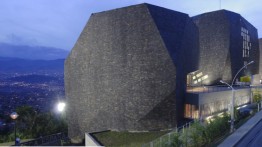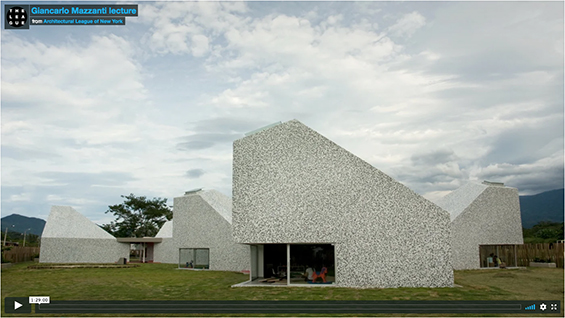Current Work: Giancarlo Mazzanti, El Equipo de Mazzanti
Tuesday, October 25, 2016, 7 - 7pm

El Equipo Mazzanti, Spain Library Park - Santo Domingo Savio. Medellín, Colombia, 2005. Image courtesy of Sergio Gómez.
Giancarlo Mazzanti's firm, El Equipo de Mazzanti approaches architectural design as a catalyst that “triggers behaviors and new dynamics, encouraging people to act in ways they will never think to act.” For Mazzanti, architecture represents an evolving process rather than a static, finished object.
The firm's 2015 contribution to the inaugural Chicago Architecture Biennial articulated this reciprocal design approach. El Equipo de Mazzanti collaborated with Nicolas París on “Speaking Architecture,” an interactive installation that encouraged visitors to write, make models, and assemble objects so as to “confront the unknown and recognize the limits of their own knowledge.” In 2016, they participated in the 15th International Architecture Exhibition of the Venice Biennial with “Trustics” an installation that instigated visitors to edit and rearrange video-recorded narratives to examine how architecture is complicit in creating networks of trust.
Other recent projects include Marinella Educational Park built this year in Marinella, Colombia; the Four Sport Halls for the South American Games in Medellín, Colombia, and Spain Library, also in Medellín. The firm designed two kindergarten schools in Santa Marta, Colombia, one in Bogota, and has proposed designs for kindergartens in Atlantico, Colombia and Reggio, Italy. El Equipo de Mazzanti also designed Pies Descalzos School and Flor de Campo School, both in in Cartagena, Colombia.
Mazzanti received a bachelor’s degree in architecture at Javeriana University, in Bogotá and completed postgraduate studies in architectural history, theory, and industrial design at the University of Florence in Italy.
He teaches regularly in Colombia and has also taught at Princeton University; Harvard’s Graduate School of Design; the University of Pennsylvania; and Columbia University’s GSAPP. He has lectured at Yale University; Pratt Institute; and the Centre Canadien d’Architecture, among other institutions.
In 2006, Mazzanti won an award in the category of public space at the XX Colombian Architecture Biennial and has also received awards at the 2008 Ibero-American Biennial in Lisbon, Portugal and the 2008 Panamerican Architecture Biennial in Quito, Ecuador. He won the Locus Foundation’s Global Award for Sustainable Architecture in 2010 and his work is held in the permanent collections of the Museum of Modern Art in New York; the Museum Georges Pompidou in Paris; and the Carnegie Museum of Art in Pittsburgh.
This lecture is co-sponsored with The Architectural League of New York and Columbia University Graduate School of Architecture, Planning and Preservation.
Tickets are free for Cooper Union students and faculty with valid ID, and League members. For ticket inquiries, please refer to The Architectural League of New York website.

Located in The Great Hall, in the Foundation Building, 7 East 7th Street, between Third and Fourth Avenues




